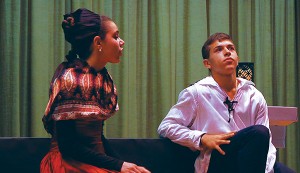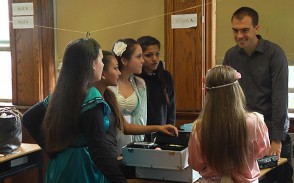
There has been much ado about Shakespeare of late at Our Lady of the Blessed Sacrament School, Bayside, where eighth graders performed a fully costumed showcase of scenes from The Bard’s most popular plays for their schoolmates and families.
“It’s astonishing. They went from being somewhat shy to slowly growing and becoming more and more confident,” said Marina D’Andrea, eighth-grade art teacher.
The showcase is an extension of the students’ learning experience with Stages on the Sound, a nonprofit theatre company that has been partnering with diocesan Catholic schools since 2009.
Earlier this year, Stages conducted its 15-week in-school performing arts residency program with Our Lady of the Blessed Sacrament’s fourth, sixth and eighth graders. The program was made possible thanks to a grant from the St. Elizabeth Ann Seton Trust, a diocesan fund that provides financial assistance to all Catholic schools.
For the eighth grade, the program culminated with the students putting on a shortened version of the comedy, “A Midsummer Night’s Dream.”
Students had learned so much and come so far that D’Andrea and Kimberly Masi, eighth-grade English teacher, didn’t want the learning process to end just because the program did in late March.
“We were so inspired by their work,” Masi said. “We wanted to integrate this into our ELA (English Language Arts) curriculum and art curriculum and continue their performance skills and working with Shakespeare.”

“We sat down with them and said, ‘Where are we going with this?’ And they had a flood of ideas,” D’Andrea added.
Those ideas took shape and students were soon studying 12 scenes from six plays: “Romeo and Juliet,” “Hamlet,” “Much Ado about Nothing,” “Richard III,” “King John” and “Two Gentlemen of Verona.”
“Students put a great deal of time into analyzing their scenes and the language to fully understand the events and message being conveyed,” Masi explained. “They took that knowledge and had to portray each character appropriately.”
“Even though we were only doing one scene, we had to research the whole play,” said Anthony Autera, one of six Romeos. “We read books. We wrote essays.”
For his role as Prince Arthur in “King John,” Karl Muczynski said he “went to the computer lab and did some research on the scene. That helped me to learn more about how to act it out.”
Having gained some historical background on the playwright and his dramatization of the reign of King John, Muczynski set to work learning the script.
“We had to run the scenes over and over. First we memorized lines and then we started putting some movements into it,” he said. “It developed after a while.”
Students spent two months developing the characters so they would be able to step into their personas credibly and skillfully.
Among those in attendance at the students’ show was Alex Teicheira, a teaching artist with Stages on the Sound, who worked with the eighth grade earlier this year.
“To see that our program doesn’t end at 15 weeks, to see the teachers want to further the students’ experience with Shakespeare and give an opportunity to keep performing is such a blessing,” Teicheira said.
“It’s not just encouragement for our program, but also shows there is a want among the kids to continue learning,” he said.
He offered students direction at their dress rehearsal and rewarded their efforts with well-deserved applause. Students looked their parts in Elizabethan-era costumes created by their teachers.
“I think we’ve all grown as people,” said Julia Sultana. “We’ve gotten more comfortable being on stage in front of people and expressing ourselves.”
And Shakespeare is a great outlet for teenagers looking to express themselves, D’Andrea noted.
“No matter the age, no matter the era, they’re all going through the same thing – confidence issues, family issues … They found that it didn’t matter the dialogue or when William Shakespeare wrote this, he understood humanity.”
Sultana said she could see that in her role as Lady Montague in “Romeo and Juliet,” when she speaks to
Romeo’s friend Benvolio about her son’s melancholy behavior.
“She’s worried about Romeo and wants to know why he’s so upset,” she said. “That’s a real thing today because parents worry.”
Sultana said learning lines, practicing the enunciation of words and rehearsing scenes will be great preparation for when she takes performing arts classes at St. Francis Prep, Fresh Meadows, this fall.
Whether or not they pursue performing arts, Masi and D’Andrea hope their students are always “willing to stretch themselves and to dive into something they’ve never done before,” much like these two teachers did with the curriculum this spring
